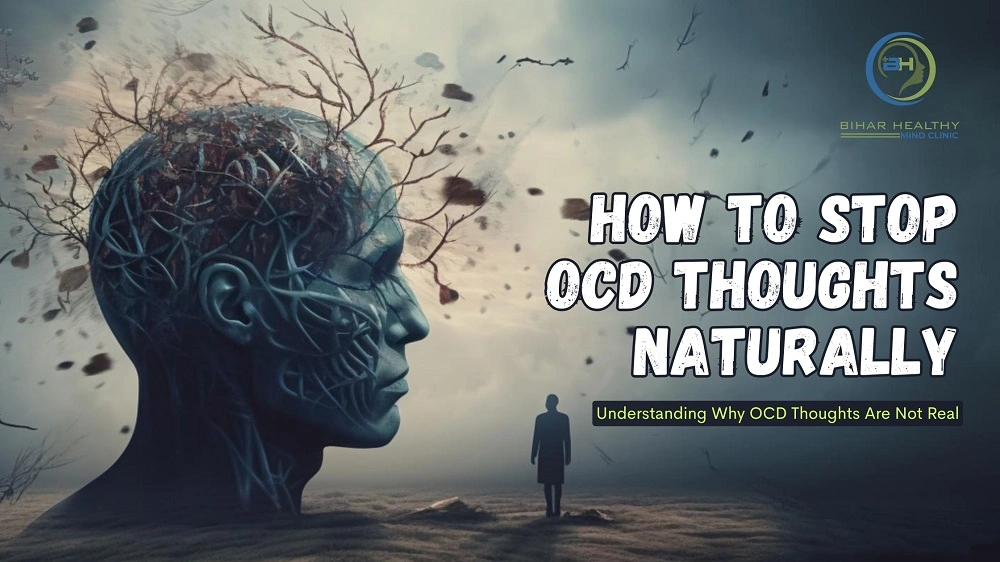
Obsessive-Compulsive Disorder (OCD) is a complex mental health condition that often leads individuals to question their thoughts, actions, and even their sense of reality. One of the most distressing aspects of OCD is the intrusive thought patterns that seem uncontrollable, illogical, and repetitive. If you’ve ever wondered whether your OCD thoughts are real, or how to stop OCD thoughts naturally, this article will help you understand the science behind them and guide you toward effective coping mechanisms.
At Patna Psychiatry, under the guidance of Dr. Saurabh Kumar, MD (Psychiatry), widely recognized as the best psychiatrist in Patna—patients receive compassionate and evidence-based treatment for OCD and related conditions.
Understanding OCD Thoughts: Are They Real?
People with OCD often experience intrusive thoughts that are unwanted and distressing. These thoughts can be about harm, contamination, doubt, or even taboo topics. They often feel real because the brain’s fear and threat systems become overactive, making the person believe that the thought could lead to real-world consequences.
However, it’s important to know that OCD thoughts are not real. They are mental misfires, unwanted signals generated by the brain’s anxiety response. Just because you think something doesn’t mean it reflects your intentions, desires, or character. OCD magnifies harmless thoughts into exaggerated fears.
For example, someone with OCD might have a fleeting thought of harming a loved one. While this can be terrifying, it doesn’t mean the person wants to cause harm. Instead, it’s the disorder creating a false sense of danger.
Why OCD Makes Thoughts Feel Real
OCD tricks the brain into treating intrusive thoughts as real threats. This happens because of how the amygdala and prefrontal cortex interact. The amygdala, which manages fear responses, overreacts to the thought, while the logical part of the brain tries to neutralize it by seeking reassurance or performing rituals. Over time, this repetitive cycle strengthens the false connection between thought and danger, making it feel more “real.”
This is why reassurance, checking behaviors, or compulsions may offer temporary relief but reinforce the OCD cycle. Understanding this process is the first step in learning how to stop OCD thoughts naturally.
How to Stop OCD Thoughts Naturally
While medical treatment under a psychiatrist’s supervision is the most effective path to recovery, there are natural and supportive strategies that can complement professional care.
1. Accept the Thought Without Judgement
The more you resist an OCD thought, the more power it gains. Instead of trying to block or replace it, acknowledge it:
"This is just an intrusive thought. It doesn’t define me."
Acceptance weakens the emotional charge and helps your brain learn that the thought isn’t dangerous.
2. Practice Mindfulness Meditation
Mindfulness helps you stay present instead of reacting to intrusive thoughts. By observing your thoughts without engaging with them, you train your brain to detach from the OCD cycle. Deep breathing and body scanning can also help reduce anxiety levels naturally.
3. Exposure and Response Prevention (ERP)
ERP is a proven psychological technique that involves gradual exposure to the feared thought while resisting the urge to perform a compulsion. Over time, this helps the brain relearn that the intrusive thought poses no actual threat. Although ERP is best done under professional supervision, the concept of facing fears rather than avoiding them is central to natural recovery.
4. Limit Reassurance-Seeking
Constantly asking others for reassurance or checking your own thoughts reinforces OCD. Try to tolerate uncertainty. Tell yourself that not knowing is okay. With practice, your anxiety about the thought will decrease.
5. Maintain a Healthy Lifestyle
Sleep, exercise, and nutrition play a vital role in brain function. A balanced diet rich in omega-3 fatty acids, magnesium, and B-vitamins can support neurotransmitter balance, while regular physical activity helps reduce anxiety naturally.
6. Journaling and Cognitive Restructuring
Writing down intrusive thoughts helps you externalize them, making them less overwhelming. Pair this with cognitive restructuring, where you challenge irrational beliefs with evidence-based reasoning. Over time, this shifts your mindset from fear to rational understanding.
7. Seek Professional Guidance
While natural methods can be helpful, OCD is a medical condition that often requires clinical intervention. At Patna Psychiatry, Dr. Saurabh Kumar and his team specialize in modern, empathetic, and personalized treatment for OCD. Combining therapy, medication (when necessary), and behavioral interventions ensures long-term recovery and improved quality of life.
The Importance of Early Intervention
Many individuals delay seeking help because they believe their thoughts are “too strange” to discuss. But OCD is far more common than most people realize, and intrusive thoughts are a hallmark symptom, not a reflection of your character or morality.
Prompt and proper diagnosis followed by timely treatment can help stop the condition from getting more severe. Psychiatrists like Dr. Saurabh Kumar, the best psychiatrist in Patna, use diagnostic tools and therapeutic approaches to help patients regain control of their thoughts and emotions.
When to Seek Professional Help
-
If your intrusive thoughts are:
- Interfering with daily life or relationships
- Causing persistent distress or anxiety
- Leading to compulsive rituals or avoidance behaviors
It’s time to reach out for help. OCD is a treatable condition, and recovery is absolutely possible with the right guidance.
Final Thoughts
OCD thoughts may seem real, but they are not reflective of who you are or what you believe. Understanding that OCD thoughts are not real is the first step toward breaking free from their grip. Learning how to stop OCD thoughts naturally can empower you to manage anxiety, reclaim mental peace, and live more mindfully.
If you or someone you know is struggling with intrusive thoughts or obsessive behaviors, professional help is available. Visit Patna Psychiatry, where Dr. Saurabh Kumar (MD Psychiatry) provides compassionate, evidence-based treatment to help patients regain mental balance and emotional clarity.
Visitors: 68





No comments yet.